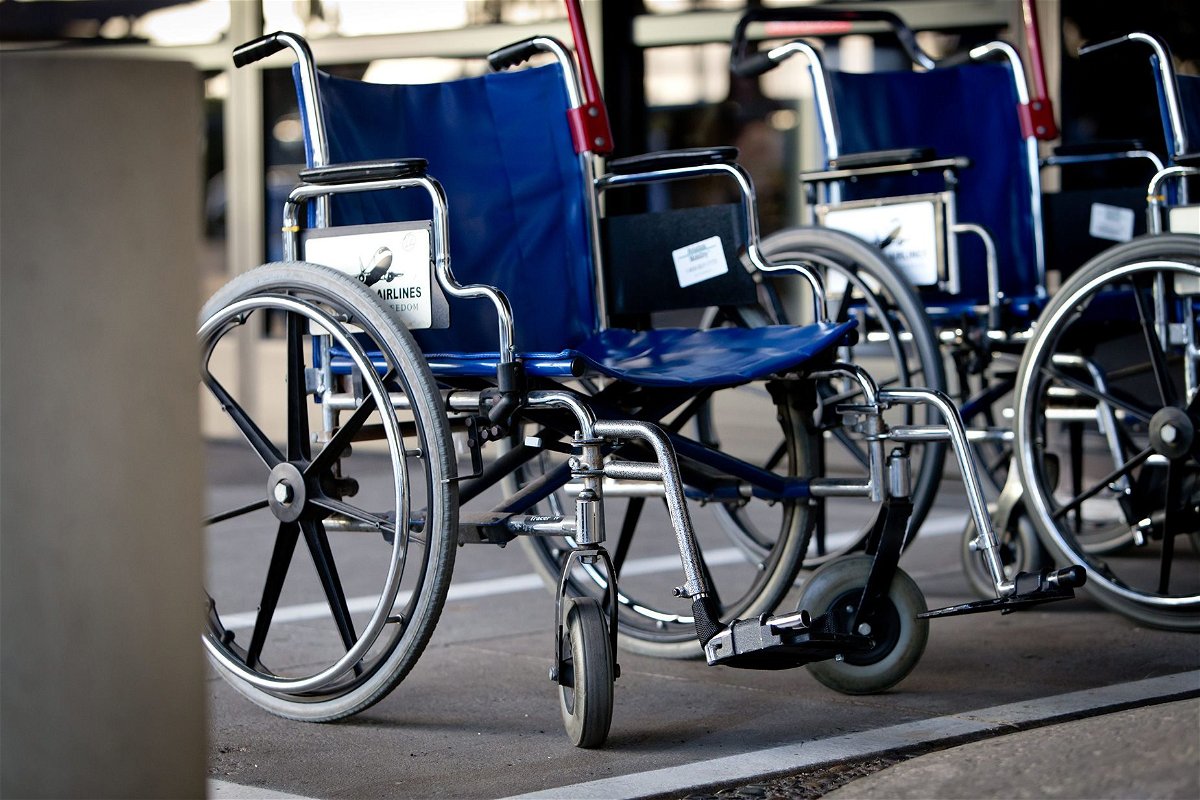Feds propose steep fines when airlines damage wheelchairs

Wheelchairs are lined up at San Diego International Airport in this file photo. Airlines damaged or lost more than 11
By Gregory Wallace, CNN
(CNN) — Airlines damaged or lost more than 11,000 passenger wheelchairs last year – and a new federal proposal seeks cut the inconvenience for wheelchair-reliant travelers with six-figure penalties against airlines.
The Department of Transportation proposal, unveiled Thursday, would establish new airline passenger rights. Those include the right of immediate notification when a wheelchair is lost or damaged, the right to a loaner and the right to choose how the wheelchair is repaired.
It would also set a federal fine of up to $124,000 for violations and require airlines enhance employee training.
“What we’re really trying to do is make clear that just like a number of other passenger protections that are encoded by rule or by law, taking proper care of wheelchairs and passengers who use them is fundamental – it’s required,” Transportation Secretary Pete Buttigieg told reporters on a conference call.
An estimated 5.5 million Americans use a wheelchair, DOT said.
Disabled travelers face hurdles to travel
Damage to a wheelchair is just one of the risks disabled people face when traveling.
Because wheelchairs do not fit into aircraft cabins, people who use wheelchairs are lifted onto a special onboard wheelchair known as an aisle chair – and then lifted again into their seats. This process can cause injuries, and some passengers have been hospitalized.
On board the plane, wheelchair-reliant passengers face a choice: Seek assistance getting to the on-board bathroom or avoid it. Disability advocates say some passengers put their health at risk by dehydrating themselves before a flight, reducing the changes of needing to move to the lavatory.
Some travelers have arrived at the gate and learned their chair is too big to fit in the aircraft’s cargo hold, too. Smaller commuter aircraft, for example, may not have space for larger powered chairs.
Some passengers say their chairs were shipped on a later flight; others had to change their plans. Proposed legislation would require airlines to provide passengers with cargo space details in advance.
Buttigieg cast the proposal as part of his broader push to overhaul the airline passenger experience – including changes to fees and seating for families – and a specific focus on wheelchairs.
DOT has set standards for bathroom access for wheelchair users, and he said the department is evaluating as a longer-term goal the possibility of wheelchairs flying in the cabin rather than the cargo hold. But the idea of a wheelchair user flying while seated in his or her own wheelchair “will take years and will require more research, more development” before becoming reality, he said.
Buttigieg defended the steep fines as appropriate for the circumstances.
“Often passengers are waiting weeks or more for their chair to be repaired or replaced,” he said. “That means it doesn’t just affect their trip – it affects their lives, long after their trip is over.”
Airlines for America, which represents the largest US passenger carriers, said the airlines are “committed to offering a high level of customer service and providing a positive and safe flight experience for passengers with disabilities.” The group said it would continue working with groups and regulators to “explore safe and feasible aircraft solutions that reduce barriers to air travel.”
Sen. Tammy Duckworth, the Illinois Democrat who leads the Senate aviation subcommittee, said at a White House event on Thursday that she thinks the fines will “wake up the airlines” to the problems experienced by disabled travelers.
“As someone who does travel with a wheelchair, I can’t tell you how many times I’ve seen my own assistive devices and others’ broken,” Duckworth said. “And people don’t realize this is a part of my body. If this is broken, you’ve broken my legs.”
The next step is for a 60-day public comment period, followed by further DOT review and work towards a final rule. Other major passenger experience rules proposed by Buttigieg’s agency have taken several years before taking effect.
The-CNN-Wire
™ & © 2024 Cable News Network, Inc., a Warner Bros. Discovery Company. All rights reserved.